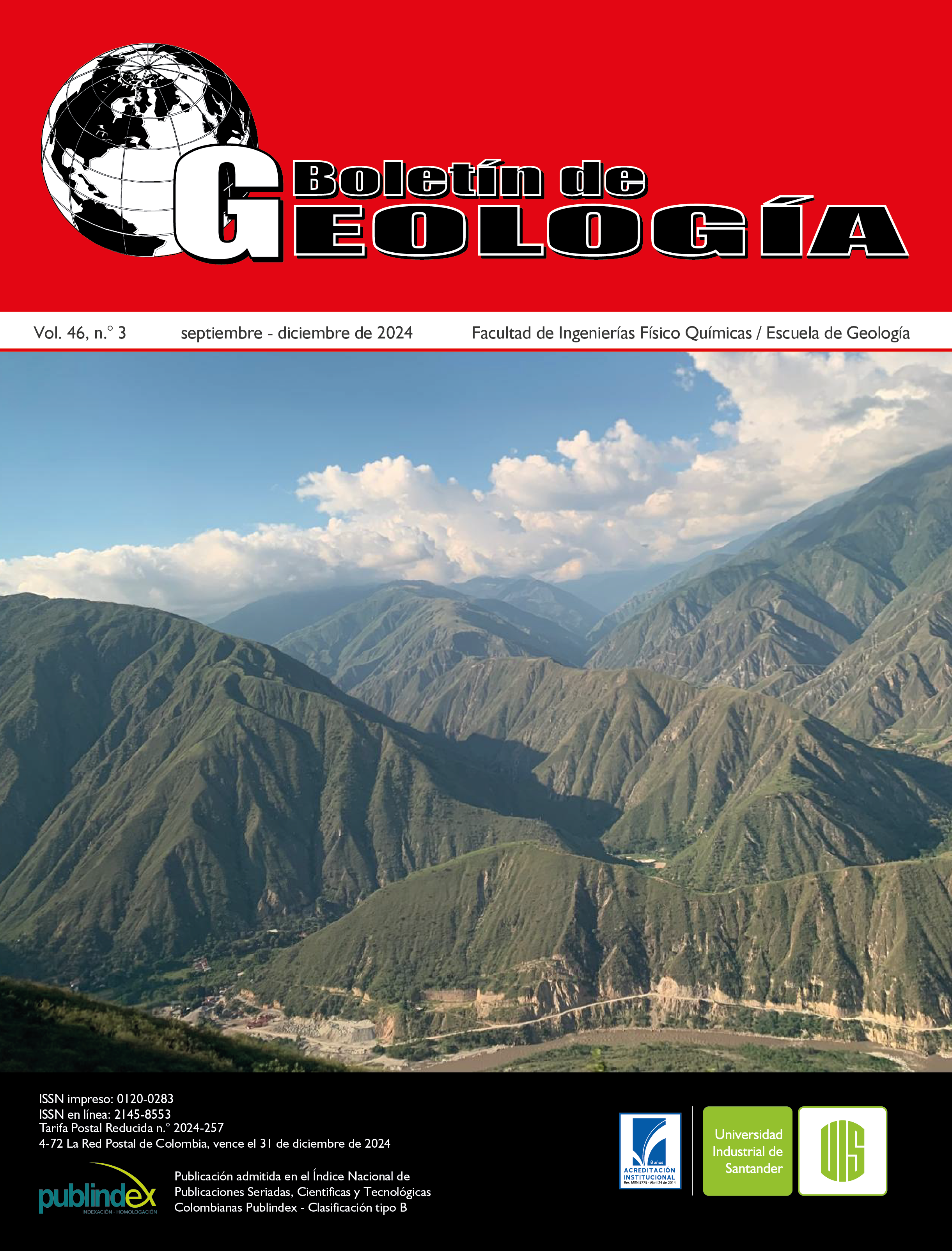Gas prospectivity in the foothills domine Cordillera basin in the western foreland Llanos Orientales basin, Colombia
Published 2024-11-28
Keywords
- Natural gas,
- Dry gas,
- Wet gas,
- Liquefied petroleum gas,
- Discovered resources
- Geological model ...More
How to Cite
Copyright (c) 2024 Boletín de Geología

This work is licensed under a Creative Commons Attribution 4.0 International License.
Altmetrics
Abstract
Colombia is a gas producing country that has managed to maintain a high level of self-sufficiency of this energy resource during the last 40 years, however the drastic decrease in reserves poses a worrying picture. The gas prospectivity study in the foothills domain (Cordillera basin) and the western foreland area of the Eastern Llanos basin aims to support exploration and production effort to increase gas reserves in Colombia. The geochemical characterization of gasses and the focus on the C3+ variable (propane (C3) + butane (C4) + pentane (C5)), indicates that 96% of the gas produced in the study area is of wet character (C3+ above 5%) and is a source of both natural gas (NG-Methane) and liquefied petroleum gas (LPG- propane-butane). The combination associated the source rock potential, thermal maturity level of the source rocks and the origin of the gas associated to primary cracking processes, allowed ideal conditions for the trapping and production of light oil, condensates, wet gas (LPG source) and dry gas (NG). Based on the integration of the results, four prospectivity play fairways are proposed: foothills, where the largest gas production in Colombia is located (NG and LPG), foredeep (deep zone of the foreland basin). In all the play fairways there are discovered oil and gas fields with production histories of more than 30 years and in the process of decline, which have a well-developed oil infrastructure. Since most of the gas is associated with oil, the increase of gas reserves in the foothills domain and the foreland of the Llanos Orientales basin depends on an integrated exploration strategy that includes both oil and gas.
Downloads
References
- Aguilera, R.; Sotelo, V.; Burgos, C.; Arce, C.; Gómez, C.; Mojica, J.; Castillo, H.; Jiménez, D.; Osorno, J. (2010). Organic Geochemistry Atlas of Colombia. Earth Sciences Research Journal, 14(Special Edition).
- ANH. (2022). Estadísticas de producción. Producción fiscalizada gas y crudo, 2021. https://www.anh.gov.co/es/operaciones-y-regal%C3%ADas/sistemasintegrados-operaciones/estad%C3%ADsticas-deproducci%C3%B3n/
- ANH. (2023). Informe de reservas y recursos contingentes de hidrocarburos, 2022.
- Damaison, G.; Huizinga, B.J. (1994). Genetic classification of petroleum systems using three factors: charge, migration, and entrapment. In: L. Magoon, W. Dow (eds.). The Petroleum System-From Source to Trap (pp. 73-89). AAPG. https://doi.org/10.1306/M60585C4
- Lorant, F.; Prinzhofer, A.; Behar, F.; Huc, A. (1998). Carbon isotopic and molecular constraints on the formation and the expulsion of thermogenic hydrocarbon gases. Chemical Geology, 147(3-4), 249-264. https://doi.org/10.1016/S0009-2541(98)00017-5
- Mora, C.; Posada, C.; De Armas, M.; Osorno, J. (2018). Genesis y prospectividad del gas en las cuencas colombianas con producción comercial de hidrocarburos. Primera Cumbre de Petróleo y Gas, Bogotá, Colombia.
- Mora, A.; Tesón, E.; Martínez, J.; Parra, M.; Lasso, Á.; Horton, B.K.; Ketcham, R.A.; Velásquez, A.; Arias-Martínez, J.P. (2020). The Eastern Foothills of Colombia. In: J. Gómez, D. Mateus-Zabala (eds.). The Geology of Colombia (pp. 123-142). Vol. 3. Servicio Geológico Colombiano. https://doi.org/10.32685/pub.esp.37.2019.05
- Mora, C.; Chajín, P.; Silveira, B.; Pérez, A. (2021). Petroleum Systems of the Llanos Orientales Basin. Reporte interno presentado a Parex Resources.
- Reyes-Harker, A.; Ruiz-Valdivieso, C.F.; Mora, A.; Ramírez-Arias, J.C.; Rodríguez, G.; de la Parra, F.; Caballero, V.; Parra, M.; Moreno, N.; Horton, B.K.; Saylor, J.E.; Silva, A.; Valencia, V.; Stockli, D.; Blanco, V. (2015). Cenozoic paleogeography of the Andean foreland and retroarc hinterland of Colombia. AAPG Bulletin, 99(8), 1407-1453. https://doi.org/10.1306/06181411110
- Sarmiento-Rojas, L.F. (2001). Mesozoic rifting and Cenozoic basin inversion history of the Eastern Cordillera, Colombian Andes. Inferences from tectonic models. Ph.D. Thesis, Vrije Universiteit, Amsterdam.
- Sánchez, N.; Mora, A.; Parra, M.; García, D.; Cortés, M.; Shanahan, T.; Ramírez, R.; Llamosa, O.; Guzmán, M. (2015). Petroleum system modeling in the Eastern Cordillera of Colombia using geochemistry and timing of thrusting and deformation. AAPG Bulletin, 99(8), 1537-1556. https://doi.org/10.1306/04161511107
- Schoell, M (1983). Genetic characterization of natural gases. AAPG Bulletin, 67(12), 2225-2238. https://doi.org/10.1306/AD46094A-16F7-11D7-8645000102C1865D
- UPME. (2019). Plan Indicativo de Abastecimiento de Gas Licuado del Petróleo (GLP). Unidad de Planeación Minero Energética.
- UPTC-ANH. (2022). Evaluación de la prospectividad del gas en Colombia en las cuencas onshore con producción comercial. Reporte final integrado del contrato 337 de 2021 celebrado entre la ANH y la Universidad Pedagógica y Tecnológica de Colombia.
- UPTC-MINCIENCIAS-ANH. (2023). Hábitat geológico, prospectividad, sostenibilidad socioambiental y económica del gas húmedo (GLP) en Colombia como combustible de transición energética. Reporte Interno a Minciencias-ANH.
- Zetaware. (2003). About ZetaWare. Interactive Petroleum System Tools. https://zetaware.com/about.html/

